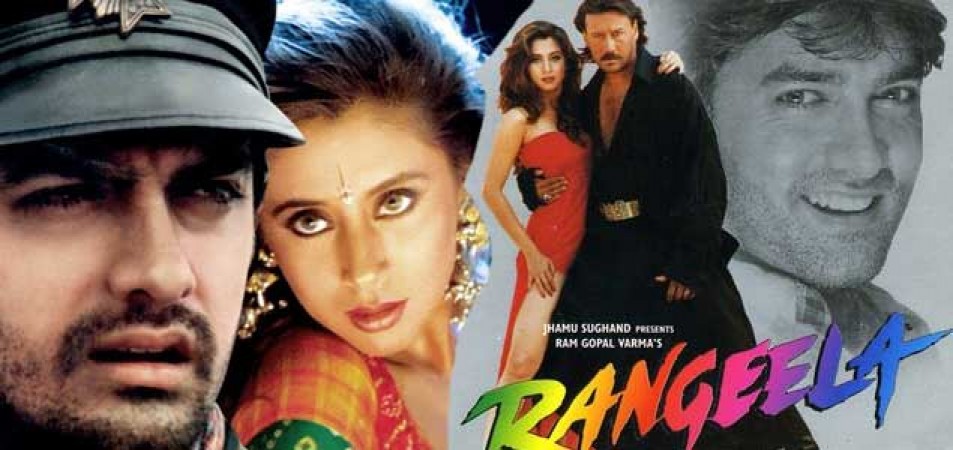
Some movies in the world of cinema go beyond being merely enjoyable; they develop into cultural phenomena that leave a lasting impression on the public consciousness. This is true of the Bollywood cult favorite "Rangeela." While the movie received praise from critics around the world for its compelling plot and upbeat music, Nepal gave it a reception that went above and beyond. In addition to being regarded as a cinematic masterpiece, "Rangeela" also has the distinction of having the longest run of any film in Nepali theaters. This article examines the remarkable journey of "Rangeela" in Nepal, where it went from being just a movie to becoming an adored component of the country's cultural heritage.
Nepal and India, which are neighbors to the south and are both located in South Asia, have a strong cultural and linguistic bond. The Mumbai-based Hindi-language film industry known as Bollywood has historically had a big impact on Nepal's cinematic landscape. Bollywood movies have found a loyal following in Nepal thanks to their entertaining stories, catchy music, and visual appeal.
The 1995 film "Rangeela," which was helmed by Ram Gopal Varma and starred Aamir Khan, Jackie Shroff, and Urmila Matondkar, was an instant hit both in India and abroad. Its allure was heightened by the energetic music that A.R. Rahman created. Nobody anticipated that this movie would make cinematic history in Nepal.
Bollywood movies have always been a favorite among Nepali viewers, and "Rangeela" was no exception. The movie was initially shown in Kathmandu's most popular theaters, where it was met with overwhelmingly positive reviews. The film's catchy music, Urmila Matondkar's captivating performance, and Aamir Khan's charisma captured audiences' attention.
The movie "Rangeela" is about Mili (Urmila Matondkar), a vivacious and aspiring actress, and Munna (Aamir Khan), a streetwise musician. The complexity of their friendship and their journey through the glamorous world of Bollywood resonated with viewers.
Something extraordinary started to happen as long as "Rangeela" was still being screened in theaters. The movie continued to play, shattering records and exceeding all expectations, rather than just playing for a few weeks or months. In Nepal, it developed into a cultural phenomenon.
Its enduring appeal was one of the primary reasons for "Rangeela's" unprecedented success. The master A.R. Rahman's music for the movie was a masterpiece that cut across language barriers. Audiences in Nepal found themselves singing along to songs like "Tanha Tanha" and "Hai Rama" long after leaving the theaters.
It wasn't just the music, though. Viewers of all ages connected with the movie's compelling plot and enduring characters. Mili was charmingly portrayed by Urmila Matondkar, and Munna, played by Aamir Khan, struck a chord with a lot of people. The story of the movie, which blended romance, friendship, and dreams, spoke to the aspirations and hopes of Nepali viewers.
The remarkable run of "Rangeela" in Nepali theaters continued as the months and years passed. To make room for new releases, the movie was eventually taken out of one of Kathmandu's major theaters, as with any long-lasting engagement. Then, something unexpected occurred.
Many fans and moviegoers protested the decision to remove "Rangeela" from the theater. The audience had developed such a strong bond with the movie that they were unable to bear for it to be taken off the big screen. To get "Rangeela" back into the theater, protests and petitions were organized, and the demand gained traction.
The demonstration was more than just a response to a movie; it was evidence of the deep emotional bond Nepali viewers had formed with "Rangeela." It had integrated into their lives and served as a source of happiness and nostalgia that they weren't prepared to give up.
The theater's management was forced to accede to the wishes of the people after being overpowered by the public outcry. "Rangeela" was given a second chance and went on to become the longest-running film in Nepali theaters.
Beyond its record-breaking run, "Rangeela" continues to be a popular film in Nepal. It illustrates the enduring connection between Bollywood and Nepali moviegoers, who keep thronging the country's theaters to take in the wonder of Indian cinema. The songs from the movie are still cherished in Nepal and are played at social gatherings like weddings and festivals.
Additionally, "Rangeela" paved the way for additional Bollywood films to establish a devoted following in Nepal. Success of the movie proved the ability of cinema to unite people across boundaries and languages by sharing their experiences and emotions.
In Nepal, "Rangeela" is much more than just a movie; it is a treasured component of the nation's cultural history. A testament to the enduring influence of narrative and music in film is its record-breaking run in Nepali theaters. The emotional connection people can have with the world of cinema is highlighted by the protests that forced "Rangeela" back onto the big screen.
It serves as a reminder of the profound influence that movies can have on our lives as the movie is still widely praised in Nepal. "Rangeela" is more than just a timeless Bollywood film; it's a representation of the enduring love, passion, and nostalgia that movies can inspire in viewers.
Alka Yagnik, Anuradha Paudwal, and Bollywood's Dubbing Drama
A Decade of Box Office Clashes: Aamir Khan and Sunny Deol Go Head to Head